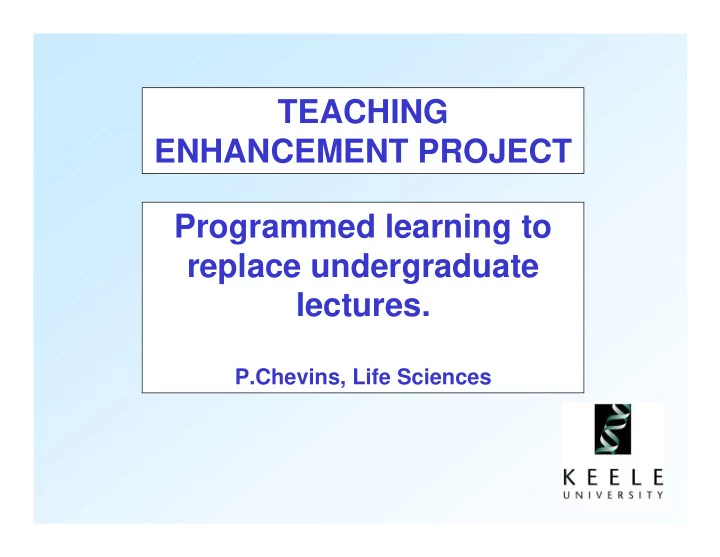

TEACHING ENHANCEMENT PROJECT Programmed learning to replace undergraduate lectures. P.Chevins, Life Sciences
THE PROBLEM • Recall of lecture material poor in revision tutorials. THE SOLUTION • Encourage more active learning. • “Great teachers stimulate active, not passive learning…” (National Committee of Enquiry into Higher Education, 1997 and Keele L & T Strategy).
THE PLAN • Replace some lectures with prescribed reading. • Follow with weekly formative objective test. • One week later, summative test on the same material. • Compare exam results with new and conventional teaching method.
THE PROGRAMME Year 2 Animal Physiology Module • Weeks 1- 5 Conventional Lectures: Salt Balance, Excretion, Respiration and Cardiovascular Physiology. • Week 6 Intro. To Nerve Physiology. • Week 7 Study Week • Week 8 Formative test (nerves) + questionnaire. Feedback and Intro. To muscle physiology • Week 9 Test 2: nerve (summative) + muscle (formative). Feedback and Intro. to endocrine physiology. • Week 10 Test 3: muscle (summative) + endocrinology (formative). + Feedback • Week 11 Test 4: endocrinology + Feedback
THE RESULTS - OBJECTIVE TESTS 70 60 50 40 % Mean 30 Formative 20 Mean 10 Summative 0 Nerves Muscles Hormones
WEEKLY STUDY HOURS 4 3.5 3 2.5 2 Hours 1.5 1 0.5 0 Nerve Muscle Hormones Formative Summative Study Week
THE RESULTS - QUESTIONNAIRE 23 RESPONDERS OF 24 (Week 1) STUDY TIME • Increased from 1.2 to 3.8 hours per week (mean) WORKLOAD • Just right:12 Too much:11 PART-TIME JOB? • 9 out of 23: mean 10.2 hours weekly
THE RESULTS - EXAMINATIONS Year Comparison of Examination Marks by Topic 70 60 50 40 Question Score (%) 1997 30 1998 1999 20 2000 10 2001 2002 0 Nerve & Muscle Endocrinology Salt Balance Respiration & Comparative Module mark & Excretion Circulation Physiology Topic
THE RESULTS - EXAMINATIONS Mean Exam Topic Marks Adjusted for Overall Module Score 120 100 80 1997 Mean Mark as Percent of 60 1998 Module Score 1999 2000 2001 40 2002 20 0 Nerve & Muscle Endocrinology Salt Balance & Respiration & Comparative Module mark Excretion Circulation Examination Essay Topic p = 0.06 (Student’s t)
EXAMINATIONS - QUESTION CHOICE Question Choices 45.0 40.0 35.0 30.0 25.0 20.0 15.0 10.0 5.0 0.0 1999 2000 2001 2002 Nerve & Muscle Endocrine Salt Balance & Excretion Respiration & Circulation
CONCLUSIONS and PLANS • The experiment was a qualified success. • Administer tests by CAA in future. • Formative tests on module web pages. • Use web discussion to provide student learning support. • Thanks to Keele Teaching Enhancement Fund and to LTSN Bioscience for financial support.
Recommend
More recommend